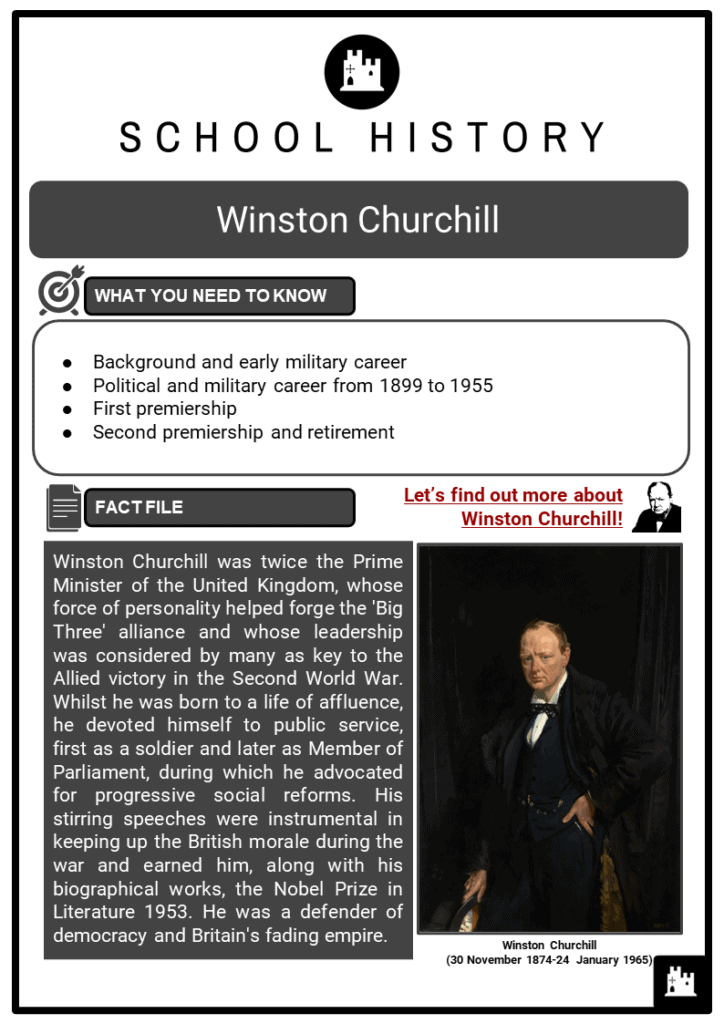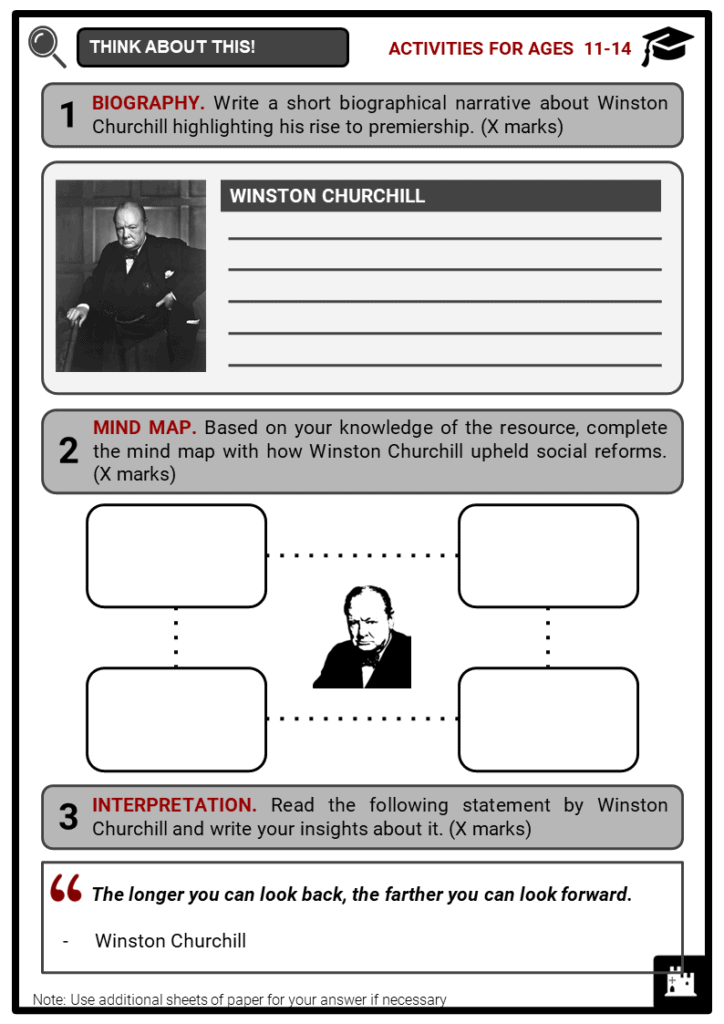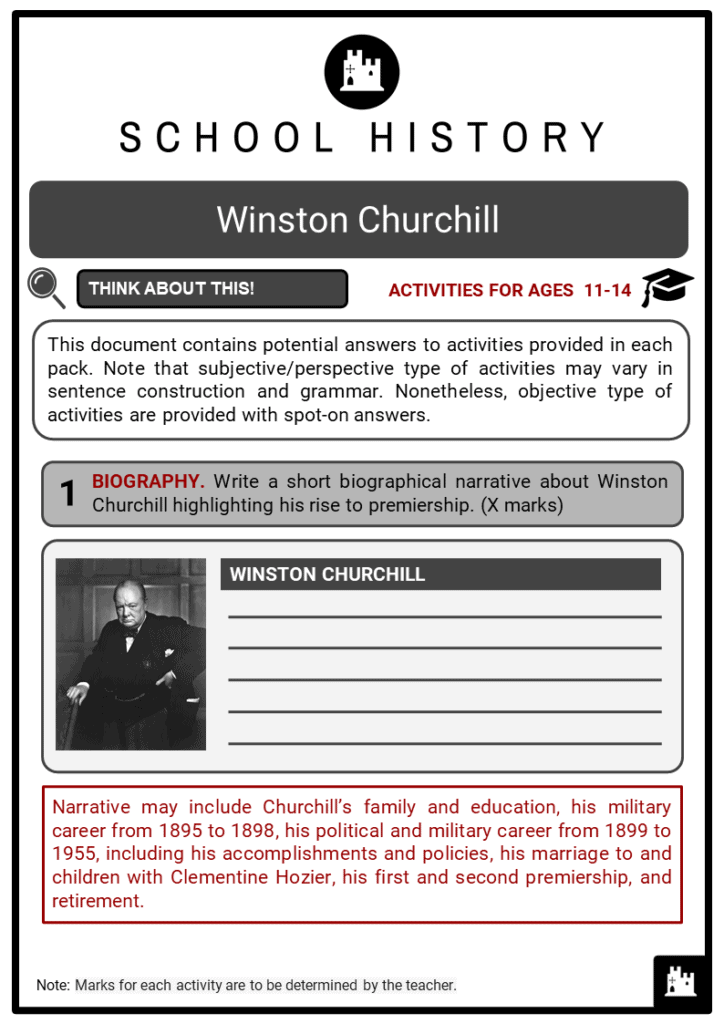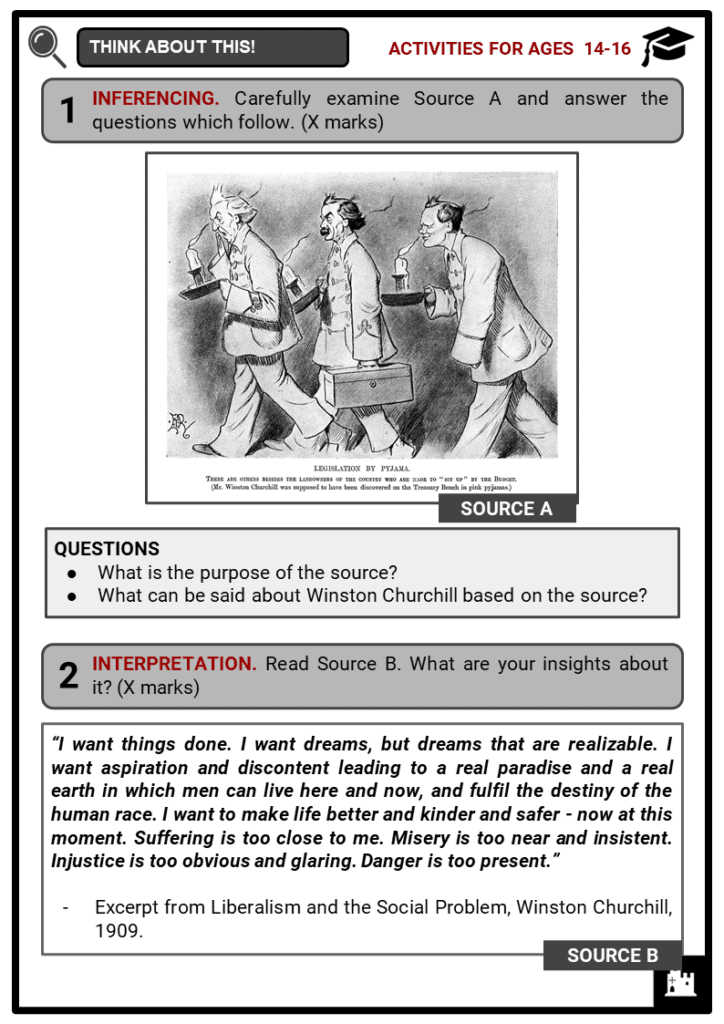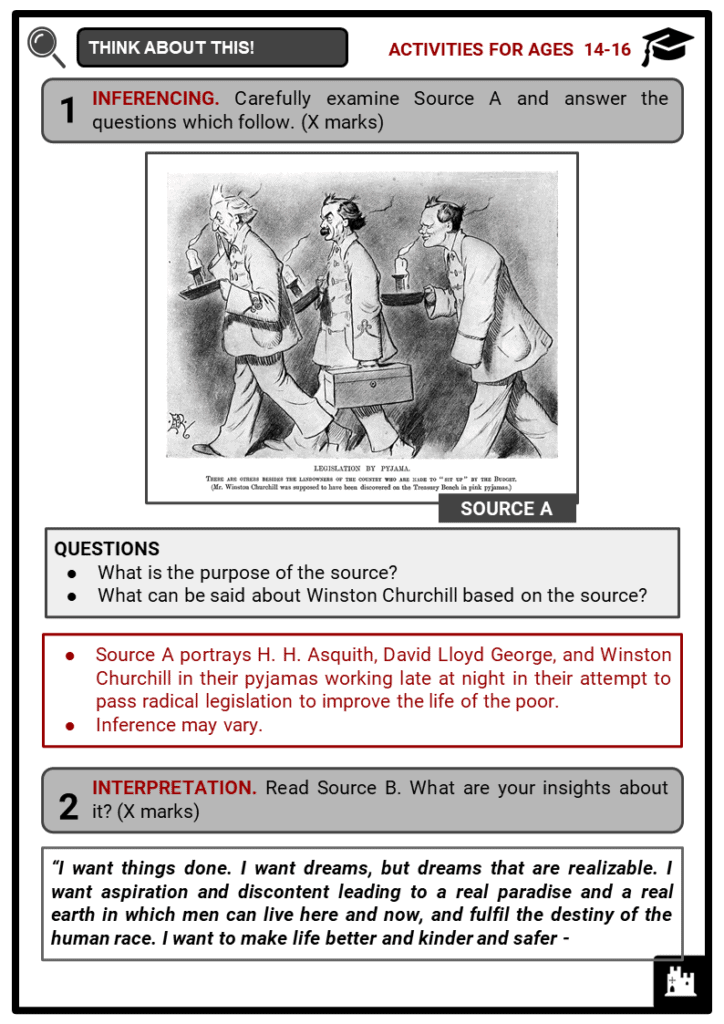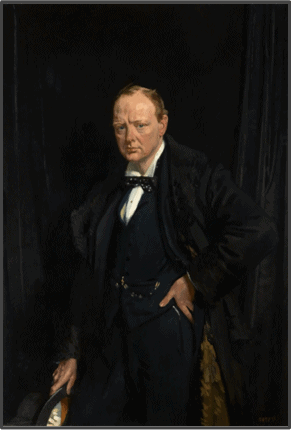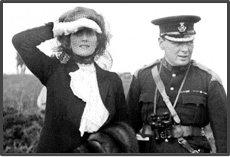Download Winston Churchill Worksheets
Do you want to save dozens of hours in time? Get your evenings and weekends back? Be able to teach Winston Churchill to your students?
Our worksheet bundle includes a fact file and printable worksheets and student activities. Perfect for both the classroom and homeschooling!
Table of Contents
Add a header to begin generating the table of contents
Summary
- Background and early military career
- Political and military career from 1899 to 1955
- First premiership
- Second premiership and retirement
Key Facts And Information
Let’s find out more about Winston Churchill!
- Winston Churchill was twice the Prime Minister of the United Kingdom, whose force of personality helped forge the 'Big Three' alliance and whose leadership was considered by many as key to the Allied victory in the Second World War. Whilst he was born to a life of affluence, he devoted himself to public service, first as a soldier and later as Member of Parliament, during which he advocated for progressive social reforms. His stirring speeches were instrumental in keeping up the British morale during the war and earned him, along with his biographical works, the Nobel Prize in Literature 1953. He was a defender of democracy and Britain's fading empire.
Background and early military career
- Born on 30 November 1874 at Blenheim Palace in Oxfordshire, Winston Churchill was the first child of Lord Randolph Churchill, a Conservative Member of the Parliament, and Jennie Spencer. He had another brother, Jack, who was born in Dublin, Ireland.
- The family relocated to Dublin due to his father's appointment as private secretary to the Viceroy of Ireland.
- The two Churchill children were under the care of Elizabeth Everest, who assisted in their private education.
- At age seven, he entered a boarding school in Ascot, Berkshire but maintained a poor academic record.
- He was transferred to Brunswick School in Hove, where his performance improved.
- At age thirteen, he passed the examination at Harrow School, where his last three years of education were in the army form.
- He was admitted to the Royal Military Academy, Sandhurst after three attempts.
- He was accepted as a cadet in the cavalry in 1893 and graduated in 1895.
- Churchill's military career began soon after graduating at Sandhurst. He was commissioned as a second lieutenant in the 4th Queen's Own Hussars regiment of the British Army.
- 1895, Cuba - wrote for the Daily Graphic about the conflict between the Spanish and the Cuban guerrillas during the Cuban War for Independence. He recalled Cuba as a large, rich, beautiful island.
- 1896, India - He went to Bombay with the Hussars as well as visited other areas, including Calcutta, Hyderabad, and the North West Frontier. In North-West India, he reported and fought in the First Mohmand campaign. This was the beginning of his writing career.
- 1898, Sudan - He joined General Kitchener's campaign in Sudan as a 21st Lancers subaltern. He was also a correspondent for The Morning Post while he was in Sudan.
- In October 1898, he went back to London after the campaign in Sudan.
- He traveled to India in December to complete his resignation from the 4th Hussars with the aims of entering politics in the United Kingdom and continuing his writing career.
Political and military career from 1899 to 1939
- Churchill was selected as one of the Conservative Party's two candidates for the June 1899 by-election in Oldham, Lancashire. However, he lost by a narrow margin to the Liberals. Afterwards, he traveled to South Africa as a correspondent for The Morning Post at the outbreak of the Second Boer War.
- Whilst in South Africa, his popularity had soared for his part in rescuing an armoured train ambushed by Boers, and for having been able to escape from military prison when he was taken as a prisoner of war.
- He returned to Britain and published his accounts during the Second Boer War in the London to Ladysmith via Pretoria.
- He stood again as one of the Conservative candidates at Oldham in the election of 1900 and succeeded this time.
- His earnings from writings and lecture tours funded his other political activities.
- He took his seat in the House of Commons in 1901. He became critical of the Conservative Government and steadily leaned to the left of parliamentary politics.
- Later in 1903, the Oldham Conservative Association withdrew its support for his candidature in the next general election.
- Now a member of the Liberal Party, he continued attacking the policies of Colonial Secretary Joseph Chamberlain and Prime Minister Arthur Balfour. He was strongly influenced by his two colleagues, John Morley and David Lloyd George.
- In 1906, he won the Manchester North West seat during the general election. In the same year, he published his father's biography, which was well received.
- Under the premiership of Campbell-Bannerman, he was appointed as Under-Secretary of State for the Colonial Office, a junior ministerial position working beneath the Secretary of State for the Colonies. His accomplishments included the following:
- Helped in drafting a constitution for the Transvaal
- Helped oversee the formation of a government in the Orange Free State
- Ensured equality between the British and Boer in southern Africa
- Announced a gradual phasing out of the use of Chinese indentured labourers in South Africa
- Following the succession of Herbert Henry Asquith to the premiership in 1908, he was promoted to President of the Board of Trade with a seat in the cabinet.
- Losing the Manchester North West seat to the Conservative candidate, he secured a safe seat at Dundee.
- He led the movement of Liberalism away from laissez-faire, and towards social reform.
- In the same year, Churchill married Clementine Hozier, who remained involved in all aspects of his life.
- Their marriage, which lasted until Churchill's death, produced five children, namely: Diana (1909), Randolph (1911), Sarah (1914), Marigold (1918) and Mary (1922).
- Churchill was able to retain his seat at Dundee following a narrow Liberal victory in the January 1910 general election.
- His proposal to abolish the House of Lords won him wide popular acclaim.
- He was promoted to the Office of the Home Secretary in February 1910, in which he spearheaded a prison reform programme.
- His response to industrial unrest and violent strikes had been dubbed as either ‘too soft’ by media outlets, or ‘too harsh’ by the Labour Party.
- The Agadir Crisis of April 1911 changed his views about the need for naval expansion, a policy that he used to oppose strongly.
- When he was appointed as the First Lord of the Admiralty in October 1911, he focused on naval preparation, including the creation of a naval war staff, increase in warship production, construction of seaplanes, and increase in the building of submarines.
- At the time, the Asquith government introduced the Home Rule Bill, which intended to provide home rule for Ireland, a move supported by Churchill.
- As the First World War broke out in August 1914, Churchill was tasked with supervising Britain's naval effort and later, the aerial defence.
- He was criticised in the press when Antwerp fell to the Germans after he promised British reinforcements to the city.
- Furthermore, the failure of his proposed campaigns in Dardanelles in 1915 led to more criticisms by many MPs, particularly the Conservatives.
- Consequently, he was demoted to Chancellor of the Duchy of Lancaster after Asquith was put under parliamentary pressure.
- After his demotion, Churchill remained an MP but resigned from the government.
- He joined the army and was assigned to the 2nd Grenadier Guards on the Western Front.
- In 1916, he was promoted to lieutenant-colonel, leading the 6th Royal Scots Fusiliers.
- He secured permission to leave active service and went back to the House of Commons, where he was repeatedly held responsible for the failure in the Gallipoli Campaign.
- In 1916, Lloyd George succeeded Asquith and appointed Churchill as Minister of Munitions.
- Churchill was later moved to the War Office as both Secretary of State for War and Secretary of State for Air in 1918.
- In 1921, he became Secretary of State for the Colonies.
- He was involved in drafting the Anglo-Irish Treaty, reducing the cost of occupying the Middle East, and declining an Arab Palestinian petition to prohibit Jewish migration to Palestine.
- The inter-war years saw Churchill turning to his brush and his pen, which financially aided him.
- He crossed the floor once again from the Liberals back to the Conservative Party, becoming the Chancellor of the Exchequer in 1924.
- He pursued his free trade principles in the form of laissez-faire economics, restored the gold standard, and presented various measures (such as, the reduction of the state pension age from 70 to 65, immediate provision of widow's pensions, reduction of military expenditure, income tax reductions and imposition of taxes on luxury items).
- He was out of office once again in 1929, and continued his writing projects for the next few years.
- He mainly worked on a four-volume biography of his ancestor John Churchill, 1st Duke of Marlborough, whilst writing speeches, giving lectures, and traveling on the side.
- He recognised the threat to the British government when Adolf Hitler came to power in 1933.
- In 1938, he voiced his disagreement with Prime Minister Neville Chamberlain's appeasement policy, and called for collective action to deter German aggression.
- His warnings against the appeasement of Nazi Germany were proven correct when the Second World War broke out in 1939, during which he was reappointed as First Lord of the Admiralty.
First premiership
- During the Norway Debate in the House of Commons, the Labour opposition held a motion of no confidence in Chamberlain's government. Chamberlain resigned in 1940 and Churchill was chosen to succeed as Prime Minister of a coalition government.
- He formed a five-man war cabinet, which included Chamberlain as Lord President of the Council, Labour leader Clement Attlee as Lord Privy Seal, Lord Halifax as Foreign Secretary, and Labour's Arthur Greenwood as a minister without portfolio.
- He later took on the additional position of Minister of Defence in response to previous criticisms that there had been no clear single minister in charge of the prosecution of the war.
- The cabinet became an agency in making swift decisions, and Churchill, as the Prime Minister, focused on the actual conduct of the war whilst dominating and consulting the Parliament.
- His premiership during the Second World War saw some of his most memorable speeches which stimulated British morale.
- I would say to the House... that I have nothing to offer but blood, toil, tears and sweat. We have before us an ordeal of the most grievous kind. You ask, what is our policy? I will say: it is to wage war, by sea, land and air, with all our might and with all the strength that God can give us; to wage war against a monstrous tyranny, never surpassed in the dark, lamentable catalogue of human crime. That is our policy. You ask, what is our aim? I can answer in one word: it isc victory, victory at all costs, victory in spite of all terror, victory, however long and hard the road may be; for without victory, there is no survival. - Churchill addressed the Commons on 13 May 1940
- Churchill's speech preceding the Operation Dynamo led to a popular view that the evacuation from Dunkirk was a miracle and a victory.
- He ordered the commencement of the Western Desert campaign and the formation of both the Special Operations Executive and the Commandos.
- Despite the damages done by the Blitz to several cities, his morale remained high and he believed that Great Britain would win the war.
- His friendship with the President of the United States at that time, Franklin D. Roosevelt, helped him to obtain vital food, weapons and other military goods through a Lend-Lease act.
- The Japanese attack on Pearl Harbor in 1941 pushed Churchill to negotiate a set of Anglo-American accords, which would enable both countries to join efforts in defeating Germany and its allies.
- Due to his intensive travel during the war, he fell ill with pneumonia. Once he was better, he carried on his travels to work out his plans.
- The formation of a Grand Alliance, consisting of the United Kingdom, the United States of America, and the Soviet Union, was key to the defeat of the Axis Powers in the Second World War.
- With victory in prospect in 1944, the revival of party politics prompted a call for an early election.
- Labour ministers declined to continue the wartime coalition, but Churchill preferred the coalition to continue at least until Japan was defeated.
- He then accepted the formation of a National Government, which allowed him to carry out the functions of Prime Minister and simultaneously handle negotiations with British allies.
- The general election of 1945 led to a landslide Labour victory led by Atlee, which could be associated to the Party's platform of economic and social reform.
Second premiership and retirement
- Churchill resigned from his post of Prime Minister, and became the Leader of the Opposition Party for six years. With the war over, he spent the next several years warning against Soviet expansionism.
- From Stettin in the Baltic to Trieste in the Adriatic, an Iron Curtain has descended across the continent. Behind that line lie all the capitals of the ancient states of Central and Eastern Europe. Warsaw, Berlin, Prague, Vienna, Budapest, Belgrade, Bucharest and Sofia, all these famous cities and the populations around them lie in what I must call the Soviet sphere. - Churchill’s Iron Curtain speech, 1946
- Churchill became the Prime Minister after the Conservatives won the general election in October 1951.
- He remained in office until his resignation in April 1955.
- In 1953, he was awarded the Nobel Prize in Literature 'for his mastery of historical and biographical description as well as for brilliant oratory in defending exalted human values'.
- Due to failing health, he often conducted business from his bedside, and was less decisive than during the war.
- His second premiership saw limited effect on domestic policy, and the Conservative Party’s acceptance of Labour’s newly created Welfare State.
- Whilst he was out of office, he remained in the House of Commons until he stood down at the 1964 general election.
- He declined Queen Elizabeth II's offer to create him Duke of London, but he accepted the Order of the Garter.
- He spent most of his retirement at Chartwell or at his London home in Hyde Park Gate.
- Nine days after suffering a stroke, Churchill died, aged 90, on 24 January 1965 and was given a state funeral six days later.
- He was buried in St Martin's Church, Bladon, near his birthplace at Blenheim Palace.
Image sources:

